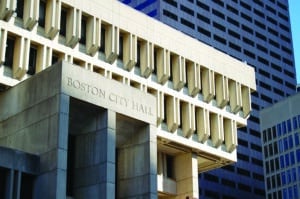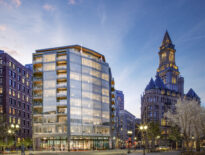Boston city councilors debated a proposal Tuesday that would give developers of home ownership condominiums priority in receiving city funding designed to break the logjam of stalled developments.
In a Sept. 25 speech to the Greater Boston Chamber of Commerce, Mayor Michelle Wu proposed a $100 million housing accelerator fund to complete financing packages for some of the more than 20,000 housing units that are permitted but yet to break ground in Boston.
But District 4 Councilor Brian Worrell is calling for a different approach that would encourage construction of home ownership units.
“It’s the best and fastest way to build wealth in the country. It’s also an anti-displacement tool,” Worrell said in presenting the proposal to the council’s Ways and Means Committee this week.
Like Wu’s proposal, the council version would tap into the city’s estimated $512 million free cash balance to attack the logjam of stalled housing developments in the city.
But it seeks to encourage planned rental projects to convert to home ownership, reflecting the importance of real estate as a wealth-building strategy. Only about 10 percent of the unbuilt pipeline includes for-sale units, Worrell said.
A Boston Foundation report last year recommended expansion of public programs that help finance construction of home ownership units, noting that only 40 percent of 35-and-over Black households in Greater Boston own a home.
The state’s CommonWealth Builder program has been hailed as a successful model. It offers subsidies for condo projects containing at least 25 percent income-restricted units in Boston and 28 economically challenged communities.
However, lenders are usually reluctant to provide financing for condo projects because of the short investment timelines and higher risk compared with rentals.
“Large projects are harder to finance when they’re for-sale [units],” said Jim Grossmann, CEO of Boston-based developer RISE Together. “You get less debt on the condos in the private marketplace, because that capital is seen as more risky. In an apartment project you can get 70 percent [debt financing]. On a condo, you’ll be in the 50-percent range, which means you need to find more expensive capital to complete the stack.”
Devin Quirk, the Boston Planning Department’s interim chief of planning, said public funding toward rental projects can be combined with state and federal subsidies not available for home ownership projects.
Wu last week announced one project already has been selected to receive funding, a 265-unit building at the Bunker Hill public housing project being redeveloped by the Boston Housing Authority and Leggat McCall Properties.
Other recipients of the fund will include public-private partnerships and private developments, Wu said at last week’s Greater Boston Chamber of Commerce breakfast.
According to the mayor’s office, Boston has a pipeline of over 20,000 permitted-but-unbuilt housing units, including 13,000 approved by the BPDA since 2022.
The state also is offering financing for housing projects seeking to complete financing through its $50 million Momentum Fund included in the $5.16 billion Affordable Homes Act.









